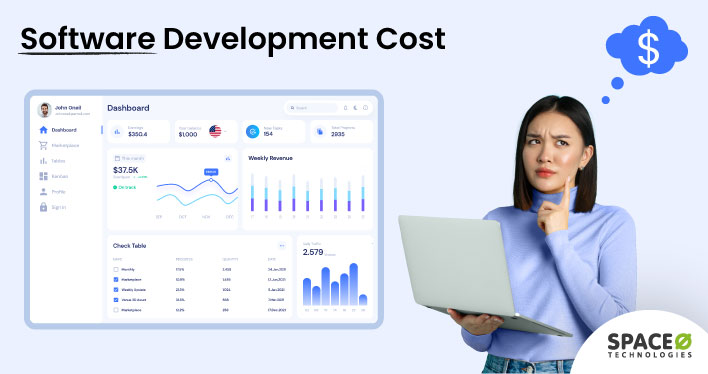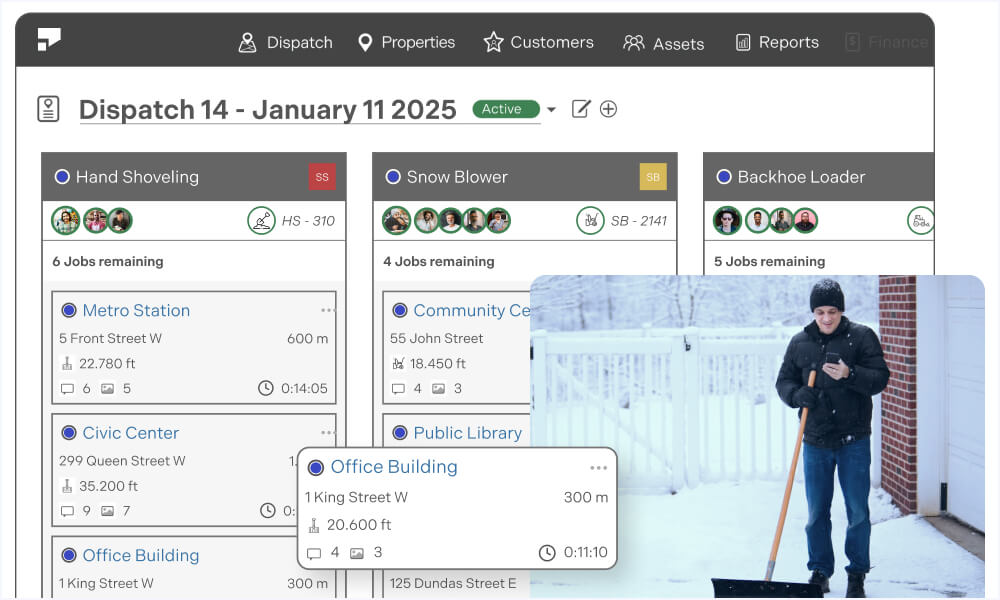“How much does software development cost?” It’s the first question every business owner asks when planning a digital transformation. But the real question isn’t just about the price tag; it’s about understanding what drives these costs and how to invest wisely.
As a leading provider of custom software development services, we’ve helped 1,200+ clients navigate software development pricing complexities. Understanding custom software development rates, pricing models, and hidden costs isn’t just helpful; it’s essential for project success.
Whether you need a cost estimate to develop a software system for your startup or enterprise, this guide has you covered. It explores real-world cost ranges, industry trends, pricing models, and proven strategies to optimize your software development budget without sacrificing quality.
Table of Contents
- Custom Software Development Cost: The Quick Answer
- 7 Key Factors That Determine Custom Software Development Cost
- Software Development Pricing Models: Which One Fits Your Project?
- 12 Smart Ways to Reduce Software Development Costs
- Hidden Costs in Software Development Projects
- FAQs About Software Development Cost
- Ready to Plan Your Software Development Investment?
Custom Software Development Cost: The Quick Answer
Custom software development costs typically range from $25,000 to $250,000+ for most business applications, with enterprise-level solutions often exceeding $1,000,000. The exact investment depends on project complexity, technology requirements, team location, development timeline, and business-specific needs.
Here is the table of software development cost breakdown.
| Type of Software | Estimated Timeline | Estimated Cost Range | Ideal For |
|---|---|---|---|
| Simple Software | 1-3 months | $25,000 – $50,000 | Startups, proof of concept |
| Medium Software | 3-9 months | $50,000 – $250,000 | Growing businesses, automation |
| Complex Software | 9+ months | $250,000 and above | Large enterprises, industry-specific solutions |
Note: The above-mentioned cost ranges are approximate figures. The exact cost relies on the project specifics, hiring models, and geographic location.
Now you know the average cost of software development, to help you get the exact cost let’s discuss the factors influencing software development costs.
Key Factors That Determine Custom Software Development Cost
Understanding these factors helps you make informed decisions and optimize your software development budget effectively. The cost to develop custom software totally depends on your software requirements. However, with this cost, you will know the overall budget of your software.
Software Type and Complexity Requirements
The type and complexity of your custom software project significantly impacts development costs. Different software categories require varying levels of expertise, time investment, and technical architecture.
Custom Software Development Categories:
Custom software development projects involve creating software from scratch. This is done through planning, designing, coding, and testing.
Type of Software Project Features Cost Complexity Score Inventory Management System - Inventory tracking
- Real-time updates
- User access control
$20,000 – $100,000+ Medium Customer Relationship Management (CRM) Software - Contact management
- Lead tracking
- Analytics
$30,000 – $150,000+ Medium Enterprise Resource Planning (ERP) Software - Financial management
- HR management
- Production management
$100,000 – $1,000,000+ High Content Management System (CMS) - Content publishing
- User management
- SEO features
$10,000 – $100,000+ Low Supply Chain Management (SCM) Software - Supplier management
- Logistics tracking
- Inventory control
$50,000 – $250,000+ High Software Modification
In these projects, the changes are made in software that already exists. Such improvements may include updates in features, bug fixes, improvement of speed and agility, and adaptation of the software to business specifications. In many cases, such projects need a deep knowledge of the current software code. Get the application modernization services from Space-O Technologies to modernize core infrastructure, migrate platforms to the cloud, and other legacy modernization services.
Type of Software Project Features Cost Adding new modules - Enhancing existing functionality
- New APIs
$5,000 – $25,000+ Bug fixing - Code analysis
- Debugging
- Security patches
$2,000 – $10,000 Performance tuning - Optimizing for speed
- Load testing
- Caching
$5,000 – $30,000+ Software Integration
Software integration projects involve combining multiple software systems or components to work together seamlessly. Integration can be horizontal, where different applications within the same organization are connected, or vertical, linking different software layers within a single system. These software project costs are essential for improving efficiency and data flow.
Type of Software Project Features to Integrate Associated Cost Inventory Management System and eCommerce Platform - Inventory synchronization
- Order processing
- Real-time reporting
$30,000 – $150,000+ Payment gateways - Real-time transaction processing
- Fraud detection
$20,000 – $100,000 API integration - Communication between diverse software
- Data mapping
$15,000 – $75,000+ Project Size and Feature Scope
Project size directly correlates with development time, team requirements, and overall costs. Here’s how different project sizes impact your budget:
Software Size Cost Factors Affecting Cost Small-scale Business $25,000 – $100,000 - Scope and complexity
- Technology stack
- Development team size
Mid-scale Businesses $100,000 – $250,000 - Integration needs
- Scalability and security
- Customization
Large Enterprises $250,000 – $5,000,000 - Regulatory compliance
- Extensive features
- Robust infrastructure
Small-scale Business
Software development for startup companies requires a strategic approach that balances innovation with budget constraints while delivering market-ready solutions.
- Small-scale startups have constrained budgets, so the average software development costs of startups are relatively low. Most often, the primary focus is on developing a Minimum Viable Product (MVP) software in order to enter the market rapidly for which these startups reach out to top software development companies.
- Startups reduce costs by utilizing cost-effective technologies and outsourcing development. Agile methodologies are frequently utilized to accommodate altering requirements.
Mid-scale Businesses
- Compared to start-ups, medium-sized enterprises require software that is more complex and scalable. To facilitate increased functionality and customization, the costs are moderately higher.
- Integration with current systems, data security, and the requirement for scalability are all significant cost factors. These companies mostly hire in-house or specialized development teams.
Large Enterprises
- Large enterprise software deals with highly advanced and complex software projects that need large financial resources. So, how much does custom enterprise software development cost in 2026? Enterprise solutions typically range from $250,000 to $5,000,000+, depending on the industry and specific requirements.
The custom enterprise software development cost in 2026 reflects factors like regulatory compliance, vast feature sets, and robust infrastructure. Enterprises frequently choose custom-built solutions and maintain dedicated development teams to handle ongoing complexity. - The greater cost is a result of factors like regulatory compliance, vast feature sets, and strong infrastructure. Enterprises frequently choose custom-built solutions and are able to maintain a dedicated team.
Development Team Location and Outsourcing Cost Impact
Geographic location significantly affects custom software development costs due to varying wage levels, talent availability, and operational expenses. In this industry, the availability of skilled professionals, the cost of living, and the level of competition varies as per the region.
These variations have a direct impact on the cost associated with the recruiting and retaining of a software development team. The important part is to realize that cost is not limited to the developer’s salary but also involves office space, utilities, and other variable administrative expenses.
As per the Accerlance, here is the table containing the region-wise cost of the software development.
Region Hourly Rate Range [NEW] Annual Developer Salary [NEW] Cost Efficiency Score North America $80-150/hour $120,000-200,000 Medium (6/10) Western Europe $60-120/hour $80,000-150,000 High (8/10) Eastern Europe $35-80/hour $35,000-80,000 Excellent (9/10) Asia Pacific $20-60/hour $20,000-60,000 Good (7/10) Latin America $30-70/hour $25,000-70,000 High (8/10) Technology Stack and Integration Requirements
A selection of the technology stack is important in determining the costs of software development. This stack encompasses programming languages, frameworks, libraries, and tools used in creating software applications.
Technology choices significantly impact development costs through licensing fees, developer availability, and integration complexity.
Here is the table containing the custom software development costs based on technology selection.Factor Explanation Example/Impact Licensing Fees Costs associated with licensing certain technologies or tools. Proprietary database management systems may require costly licenses. Developer Availability and Rates The cost and availability of developers proficient in a particular technology. Developers specialized in less common technologies may charge higher rates. Maintenance and Scalability Technologies that are easy to maintain and scale can reduce long-term costs. Easier debugging and maintenance can lead to lower long-term costs. Integration Capabilities The ease with which a technology can integrate with other systems or tools. Smooth integration can expedite the development process, lowering costs. Long-Term Viability Long-term support and updates for technology can reduce future migration or re-development costs. A technology likely to remain supported will reduce future costs associated with migration or re-development. UI/UX Design Sophistication and User Experience Requirements
User interface and experience design complexity directly impacts development time and costs through visual requirements, interaction complexity, and usability optimization.
The complexities of UI/UX design include visual elements, user journey, and the general usability of the application. Designing good UI/UX may result in higher user satisfaction and participation, but it usually consumes more time, effort, and money.
Here is the table containing software development costs based on the complexity of UI/UX design.
How Design Depth Affects Software Development Cost
Design Complexity Cost Range [NEW] Design Hours [NEW] Features Included Basic $10,000 – $25,000 80 – 200 hours Standard templates, minimal customization Custom $25,000 – $60,000 200 – 400 hours Brand-specific design, custom components Premium $60,000 – $150,000+ 400 – 800+ hours Advanced animations, interactive elements Collaboration Model and Partnership Structure
The hiring model highly affects software development costs. Your chosen partnership model significantly affects project costs, timeline flexibility, and resource allocation.
Here are the primary hiring models.Freelancers
Freelancers are self-employed developers, providing programming services on a per-project basis. Hiring these freelancers is also cost-efficient because, unlike full-time employees, you only pay for their services when you need them. However, managing a team of freelancers can be complex and requires specific project management skills.
In-house
An in-house development team consists of full-time professionals from your company. Payroll, benefits, and other overhead costs may make this option more expensive, despite the increased control and accessibility it provides.
Outsource
Software development outsourcing is the process of hiring a software development agency or team to develop your custom software, which is often situated in another region or country. This approach may save money and provide access to a worldwide talent pool, but it may need careful vendor selection and project management.
Here is the table containing the software development costs based on hiring models.
Hiring Model Cost Range Project Flexibility Cost Control Freelancers $20,000 – $100,000+ Easily adaptable to changing project needs Potential for cost overruns In-house $100,000 – $500,000+ High level of control and customization Fixed employee costs Outsource $30,000 – $200,000+ Access to a diverse skill set and expertise Limited control over external team costs
Looking for an Accurate Software Development Cost Estimate?
Use our calculator to share your project requirements, and our experts will connect with you to discuss detailed pricing and timelines.

Building upon our discussion, let’s now take a look at the key software development pricing models you can choose based on your project requirements.
Software Development Pricing Models: Which One Fits Your Project?
Understanding software development charges across different pricing models helps you choose the right approach for your budget and project needs. Here’s how each model structures its software development cost:
1. Fixed price model
Best for: Projects where you know exactly what you want, have detailed specifications, and don’t anticipate significant changes during development.
You pay one agreed-upon price for a defined scope of work. The software developer or the team commits to delivering specific features within a set timeline at a pre-decided cost, regardless of the actual hours spent.
Typical Cost Range: $25,000–$150,000 for most fixed-price projects
When to Use:
- Small to medium projects with clear, stable requirements
- Well-documented specifications with minimal expected changes
- Strict budget control is needed with no room for overruns
- Projects with a timeline under 6 months
- Proof-of-concept (PoC) or MVP development
| Pros | Cons |
|---|---|
| Predictable development budget with no surprises | Limited flexibility for scope changes or new feature requests |
| Clear deliverables and acceptance criteria defined upfront | Changes mid-project can be expensive and time-consuming |
| Minimal day-to-day management is required from your side | Requires extensive upfront planning and documentation |
| Vendor assumes development risk | Quality may suffer if the vendor cuts corners to meet the fixed budget |
2. Time & Materials (T&M) Model
Best for: Projects with uncertainty, innovative solutions, or where you want ongoing input and the ability to refine features based on real-world feedback and testing.
This model estimates software development costs based on the time and resources utilized in development. You pay for actual hours worked at agreed custom software development rates, typically $25-$150+ per hour depending on the team’s location, expertise, and technology stack. This transparent custom software development pricing structure works well for evolving projects. Additionally, you may also have to pay for the resources and materials used in software development.
How It Works: Monthly or bi-weekly invoicing based on actual time spent by each team member (developers, designers, QA, project managers) multiplied by their hourly rates.
When to Use:
- Evolving requirements where the scope isn’t fully defined
- Complex, innovative projects where the exact path isn’t clear
- Need for flexibility to pivot based on user feedback
- Long-term development with continuous improvements
- Projects requiring ongoing collaboration and iteration
| Pros | Cons |
|---|---|
| Maximum flexibility to adjust scope, features, and priorities | Less budget predictability, the final cost to develop software may exceed estimates |
| Transparent costs – you see exactly what you’re paying for | Requires active management and regular progress monitoring |
| Focus on quality rather than just meeting the fixed scope | Potential for scope creep without disciplined oversight |
| Easier to scale the team up or down based on the project phase | Need for clear communication and milestone definition |
3. Dedicated Team Model
Best for: Companies with ongoing development needs, those building complex platforms requiring continuous enhancement, or businesses wanting to scale their development capacity cost-effectively.
Hire a team of developers who work exclusively on your project for an extended period, functioning as an extension of your in-house staff. You pay a monthly fee per team member.
Typical Cost Range: $5,000–$25,000+ per developer per month, depending on seniority and location
How It Works: You get a dedicated team (developers, designers, QA engineers) who work full-time on your project. You manage priorities and tasks while the team handles execution. This is essentially remote staff augmentation.
When to Use:
- Long-term projects spanning 6+ months
- Continuous development needs multiple phases
- Building multiple features or products simultaneously
- Need for specific expertise not available in-house
- Want to scale development capacity without hiring overhead
| Pros | Cons |
|---|---|
| Team stability and deep knowledge of your codebase | Management overhead, you direct the team’s daily work |
| Knowledge retention, as the same people understand your business context | Usually requires a 3–6 month minimum commitment |
| Highly scalable, easily add or reduce team members | An integration effort is needed to align with your processes |
| More cost-effective than building an in-house team | Time zone challenges when working with offshore teams |
Now that you know the average cost of software development and the pricing models you can choose from, it’s time to highlight some smart ways to optimize your software development costs.
12 Smart Ways to Reduce Software Development Costs Without Sacrificing Quality
Understanding the cost of software development is just the start. The real question is: how do you optimize your software development budget without compromising quality? Here are a few proven strategies that consistently reduce costs while maintaining high standards.
Leverage open-source technologies
Instead of expensive custom-developing everything, use proven open-source frameworks like React, Node.js, and PostgreSQL. These eliminate licensing fees and accelerate development with battle-tested tools. Potential savings are often 20–40% through reduced licensing costs and faster development cycles.
Start with an MVP, then scale
Building everything at once is the biggest budget killer. Focus on core features that solve your primary problem first. Validate with real users before investing in the full vision. This phased approach substantially reduces initial cost to develop software while ensuring you build what users actually want, not what you assume they need.
Adopt agile methodology
Agile’s iterative approach catches problems early when they’re cheapest to fix. Issues found during development cost significantly less than those discovered after launch. Continuous feedback prevents expensive rework and keeps projects aligned with actual needs, helping teams stay within budget while delivering better results.
Embrace cloud infrastructure
Cloud platforms like AWS and Azure offer pay-per-use pricing, auto-scaling, and managed services that eliminate infrastructure overhead. You pay only for what you use instead of maintaining expensive servers. This approach substantially cuts infrastructure costs while improving reliability, scalability, and deployment speed.
Manage technical debt proactively
Quick fixes save time today but create compounding costs tomorrow. Regular code reviews, scheduled refactoring, and comprehensive documentation prevent technical debt accumulation. While proactive management requires upfront investment, it dramatically reduces long-term software development costs through faster feature development and fewer bugs.
Invest in automated testing
Automated tests catch bugs immediately after introduction, when they’re cheapest to fix. While adding time to initial development, automated testing drastically reduces bug-fixing costs and enables faster releases. A bug caught in production costs exponentially more to fix than one caught during development through automated tests.
Define clear requirements upfront
Poor requirements are the #1 cause of budget overruns. Thorough requirements gathering, including stakeholder interviews, detailed user stories, and visual mockups, prevents costly rework that often consumes significant portions of project budgets. Time invested in requirements planning saves substantial development time and reduces change requests.
Consider strategic outsourcing
Custom software developer rates vary dramatically by location. Latin American teams offer substantial savings versus US rates while providing time zone alignment for real-time collaboration. Eastern European teams deliver similar cost advantages with strong technical expertise. Strategic outsourcing can reduce project costs considerably without sacrificing quality when managed properly.
Use feature flags for controlled rollouts
Deploy features gradually to catch issues early with minimal user impact. Feature flags enable A/B testing so you invest only in features users prefer, reducing deployment risks and preventing investment in unwanted functionality.
Optimize development tools
Modern IDEs, CI/CD pipelines, and performance monitoring tools increase developer productivity substantially. While these tools require a monthly investment per developer, they easily justify costs through faster, higher-quality development and reduced debugging time.
Establish code quality standards
Peer code reviews, consistent conventions, and a clear “definition of done” prevent technical debt accumulation. High-quality code reduces long-term software development costs through faster feature development, easier maintenance, and fewer production bugs that require emergency fixes.
Invest in team training
Skilled developers work significantly faster with fewer bugs. Annual training investment per developer typically delivers strong returns through improved productivity, better code quality, and enhanced team retention. Developers who receive training opportunities stay longer and contribute more effectively.
Hidden Costs in Software Development Projects
When calculating the total cost of custom software development, many businesses overlook expenses beyond the core development budget. These hidden costs can add 20-40% to your initial estimate if not planned for.
Pre-development expenses
Before any code is written, several foundational activities consume budget and time.
Discovery and Planning Phase ($5,000–$25,000):
- Business analysis, technical architecture planning, competitive research, and legal/compliance consultation lay the foundation but consume budget before development starts.
Team Ramp-up Costs ($3,000–$15,000):
- Developer onboarding, tool and license setup, security configuration, and the initial productivity ramp-up period add costs that are often overlooked.
Development Phase Hidden Costs
Even with clear requirements, several factors during development add unexpected expenses.
Change Management ($10,000–$50,000):
- Scope changes, feature additions, stakeholder feedback implementation, and requirement refinements are inevitable, even with clear initial planning.
Integration Complexities ($15,000–$75,000):
- Legacy system compatibility, third-party API limitations, and data migration challenges can increase development effort beyond estimated timelines.
Quality Assurance Extras ($8,000–$30,000):
- Extended testing cycles, performance optimization, security vulnerability testing, and user acceptance testing coordination introduce more than anticipated cost.
Post-Launch Expenses
The costs don’t end when your software goes live; ongoing investments are essential for success.
Deployment and Go-live ($5,000–$20,000):
- Production environment setup, data migration, user training, documentation, and go-live support require dedicated resources.
Ongoing Maintenance (15–25% of development cost annually):
- Bug fixes and patches ($5,000–$15,000/year)
- Security updates ($3,000–$12,000/year)
- Performance monitoring ($2,000–$8,000/year)
- Feature enhancements ($10,000–$40,000/year)
Compliance and Security Costs ($25,000–$160,000)
Regulated industries face additional mandatory expenses that can’t be avoided.
Industry Compliance ($10,000–$100,000):
- HIPAA compliance for healthcare
- PCI DSS for payment processing
- GDPR for EU data handling
- SOX compliance for financial services
Security Implementation ($15,000–$60,000):
- Security audits and penetration testing
- Data encryption and secure communications
- Access control systems and authentication setup
- Incident response and monitoring systems
When planning your software development pricing, always account for these hidden costs alongside your core development budget to avoid surprises.
Check out some of the top software solutions developed by Space-O Technologies.
If you still have doubts about the software development costs then check out the next section about the FAQs associated with software development costs.
FAQs About Software Development Cost
What are the hidden costs in software development projects?
Here are the hidden costs involved in software development.
- Changes and modifications to the project’s scope can result in an increase in development duration as well as costs.
- The cost of software licensing, apps, and third-party services can add up over time.
- Expenditures for hosting, servers, or specialized hardware may be required.
- Unanticipated problems could necessitate additional testing and debugging efforts.
- The ongoing maintenance and upgrades might result in additional costs.
- Protecting your software with strong security methods may cost you extra.
- Expenses associated with project administration, team meetings, and communication.
How much time does it take to develop software?
The average timeframe for developing software ranges from 2 to 8 months.
Depending on the project type, smaller projects take around 2-4 months, medium complexity projects require 4-6 months for development and complex projects take around 6-12 months. These figures are approximate, the exact cost depends on the following factors.
- Complexity and depth of the project.
- Size and expertise of the development team.
- Selection of programming languages and tools.
How much does it cost to hire a software developer?
The average cost to hire a software developer ranges from $25 to $120+ per hour.
For a junior developer the cost ranges between $30-45/hour, for a mid-level developer the cost ranges between $45-70/hour and for the experienced developer the cost ranges between $70-120/hour. Still, these figures are approximate, the exact cost varies based on the following factors.
- Experience and skill set of developers.
- Location of the software developers
- Project’s complexity and scope
- Types of hiring models (In-house, outsourced, freelance)
Ready to Plan Your Software Development Investment?
How much does it cost to build software? The answer depends on your project’s unique requirements, from complexity and features to team structure and timeline. This guide has walked you through real cost ranges, pricing models, 2025 industry trends, hidden expenses, and actionable strategies to optimize your budget while delivering quality solutions.
Finding the right development partner makes this journey smoother. Space-O Technologies specializes in software development with transparent cost estimation and strategic planning, helping businesses understand exactly what they’re investing in and why. Our proven expertise in software development, backed by 15+ years of experience, helps you gain confidence in your investment decisions while avoiding costly surprises.
With 1200+ successful projects across industries, we’ve earned a 97% client retention rate by consistently delivering value. Our team has helped businesses transform their operations through custom software. Get in touch today for a detailed software development consulting session and accurate cost estimates tailored to your specific requirements and business goals.







